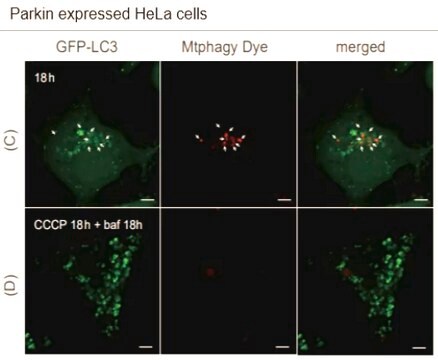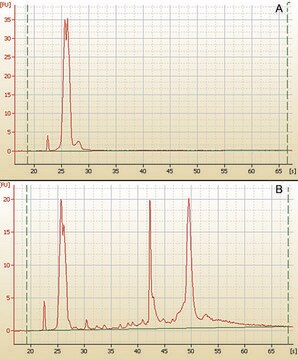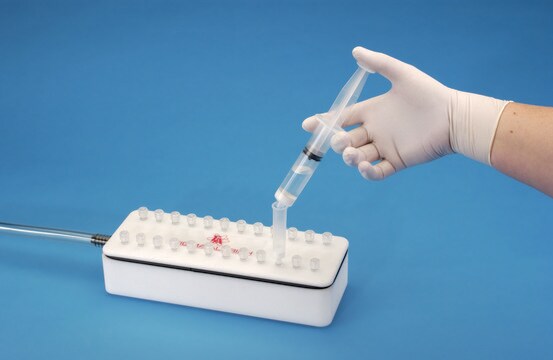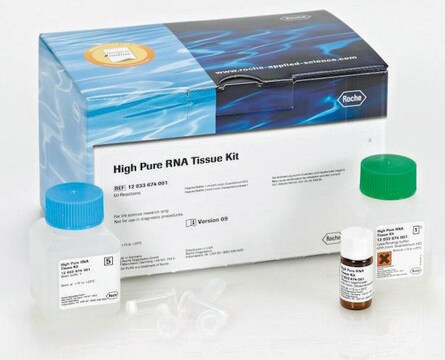SCT263
BioTracker™ Mitophagy Detection Kit
Human
Sinonimo/i:
mitochondrial degradation probe, mitophagy detection, mitophagy live cell kit, mitophagy probe
Autenticatiper visualizzare i prezzi riservati alla tua organizzazione & contrattuali
About This Item
Codice UNSPSC:
41106514
NACRES:
NB.12
Origine biologica:
human
Produttore/marchio commerciale:
Millipore
Prodotti consigliati
Nome del prodotto
BioTracker™ Mitophagy Detection Kit,
Origine biologica
human
Livello qualitativo
Stato
lyophilized solid
Confezionamento
vial of 1 kit
Produttore/marchio commerciale
Millipore
tecniche
cell culture | stem cell: suitable
Condizioni di spedizione
2-8°C
Temperatura di conservazione
2-8°C
Descrizione generale
Two-probe kit for detection of mitophagy and confirmation of fusion with the lysosome useful for study of PD, AD, and other diseases where mitochondrial dysfunction and processing is known to be critical.
SPECTRAL PROPERTIES
Mitophagy probe:
λex: 530 nm
λem: 700 nm
Lysosome probe:
λex: 398 nm
λem: 525 nm
A 100 uM stock solution of the mitophagy probe is created by dissolving 50 uL DMSO to one tube (5 ug) of mitophagy dye. A typical working solution concentration is 1 nM.
A 1 mM stock solution of the ysosome dye is created by resuspending the contents of the lysosome dye in 55 uL DMSO. A typical concentration for the working solution is 1 uM.
SPECTRAL PROPERTIES
Mitophagy probe:
λex: 530 nm
λem: 700 nm
Lysosome probe:
λex: 398 nm
λem: 525 nm
A 100 uM stock solution of the mitophagy probe is created by dissolving 50 uL DMSO to one tube (5 ug) of mitophagy dye. A typical working solution concentration is 1 nM.
A 1 mM stock solution of the ysosome dye is created by resuspending the contents of the lysosome dye in 55 uL DMSO. A typical concentration for the working solution is 1 uM.
Caratteristiche e vantaggi
The SCT263 kit is composed of a mitophagy detection probe and a lysosome probe. The mitophagy dye accumulates in intact mitochondria where it is immobilized by chemical bonding and emits weak fluorescence. Upon mitophagy and fusion with the lysosome, damaged mitochondria increase in fluorescence in tandem with decreased pH.
Descrizione del bersaglio
Mitochondria are cytoplasmic organelles that play a crucial cellular role in the production of energy for cell viability and function. Recently, mitophagy has been shown to be related to Alzheimer′s and to Parkinson′s diseases and induced by the accumulation of depolarized mitochondria. Mitophagy serves as a specific elimination system in which dysfunctional mitochondria damaged by oxidative stress in DNA are sequestered into the autophagosome, fused to the lysosome, and degraded by digestion.
Stato fisico
purple solid (mitophagy probe), yellow solid (lysosome probe)
Stoccaggio e stabilità
Store at 2 - 8 °C, protected from light.
Altre note
This live cell probe mitophagy detection kit includes a probe for mitochondrial degradation (far red) plus a probe to confirm association of degraded mitochondria with the lysosome (green). The kit can be used in conjunction with SCT272, BioTracker Red Mitochondria Live Cell Probe.
Note legali
BioTracker is a trademark of Merck KGaA, Darmstadt, Germany
Esclusione di responsabilità
Unless otherwise stated in our catalog or other company documentation accompanying the product(s), our products are intended for research use only and are not to be used for any other purpose, which includes but is not limited to, unauthorized commercial uses, in vitro diagnostic uses, ex vivo or in vivo therapeutic uses or any type of consumption or application to humans or animals.
Codice della classe di stoccaggio
10 - Combustible liquids
Classe di pericolosità dell'acqua (WGK)
WGK 3
Certificati d'analisi (COA)
Cerca il Certificati d'analisi (COA) digitando il numero di lotto/batch corrispondente. I numeri di lotto o di batch sono stampati sull'etichetta dei prodotti dopo la parola ‘Lotto’ o ‘Batch’.
Possiedi già questo prodotto?
I documenti relativi ai prodotti acquistati recentemente sono disponibili nell’Archivio dei documenti.
Il team dei nostri ricercatori vanta grande esperienza in tutte le aree della ricerca quali Life Science, scienza dei materiali, sintesi chimica, cromatografia, discipline analitiche, ecc..
Contatta l'Assistenza Tecnica.







